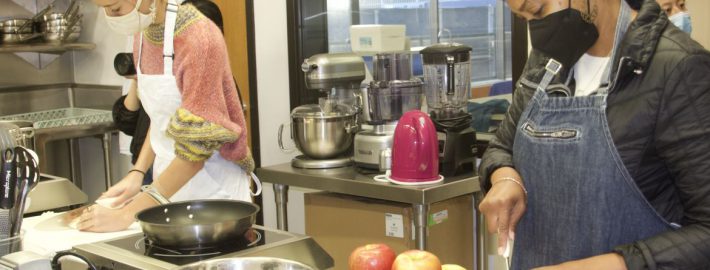UCLA food studies institute to tackle global food challenges
Increasingly, scholars are studying food — its production, preparation, sharing, consumption and disposal — to better understand and tackle global challenges such as climate change, health and social disparities and labor conditions, and to improve access to information.
Already a leader in the emerging field of food studies, UCLA has created an interdisciplinary institute devoted to research, teaching and policy about food, made possible by an anonymous $13.5 million gift.
The UCLA Rothman Family Institute for Food Studies will bring together faculty, staff, students, chefs and members of the community and house UCLA’s popular food studies minor and graduate certificate program. The gift will provide ongoing funding for research, curriculum and library resources, including the first endowed food studies librarian at a university, as well as hands-on experiential learning opportunities such as a new chef-in-residence program that would begin in spring 2022. It will expand the offerings of the UCLA Teaching Kitchen, launched in 2019, which helps students learn to cook healthy and affordable meals and which has operated remotely during the pandemic.
“Food is central to the human experience, and this new institute will play a leading role in examining aspects of our relationship with food as well as the ways in which food systems tie into larger issues like public health, sustainability and economic well-being,” said UCLA Chancellor Gene Block. “The institute exemplifies what UCLA does so well, which is bring communities together alongside experts from across the disciplines to address some of society’s most complex challenges.”
The institute bolsters the UC Office of the President’s Global Food Initiative, created in 2014 and focused on how to feed a world population expected to reach 8 billion by 2025.
“UCLA is uniquely positioned as a leader in food studies,” said biophysicist Amy Rowat, UCLA’s Marcie H. Rothman Professor of Food Studies. “We are known for our strengths in the sciences and the arts, and have strong partnerships with community organizations dedicated to equal food access. We will also capitalize on UCLA’s location in one of the most diverse cities in the world, which is home to so many innovative chefs.”
Rowat, an associate professor of integrative biology and physiology in the UCLA College, is a pioneer in using food to introduce complex concepts in science to nonscientists. She is co-director of the UCLA Semel Healthy Campus Initiative EatWell pod and the founder and director of the Science and Food organization at UCLA. Rowat will spearhead many of the institute’s activities, including expanding her long-running science and food course and developing the chef-in-residence program, a 10-week interdisciplinary course in which chefs are paired with faculty to engage students on topics from food equity to the microbiome. Rowat’s lab will continue to develop sustainable options for food production.
Helping to advance the institute’s vision and Rowat’s work is UCLA Library’s new Rothman Family Food Studies Librarian. Alexandra Solodkaya is the first person to hold the position and she will curate a broad scope of food-related research and teaching services, materials and collections. Given the speed with which social media can amplify incorrect information, the food studies librarian will challenge students to think critically about sources.
“We are grateful for this gift — the largest in the division’s history — which will allow more of our students and faculty to delve into this growing area of inquiry,” said Adriana Galván, dean of the division of undergraduate education, who emphasized how the institute’s interdisciplinary approach would benefit students.
“Food can heal. The institute is looking at food from a system-based, interdisciplinary perspective to contribute to the health and well-being of the individual, community and the planet,” said Dr. Wendelin Slusser, associate vice provost of Semel Healthy Campus Initiative Center at UCLA, whose work across campus and in Los Angeles helped build the foundation for the institute.
View the original post by Elizabeth Kivowitz at UCLA Newsroom




